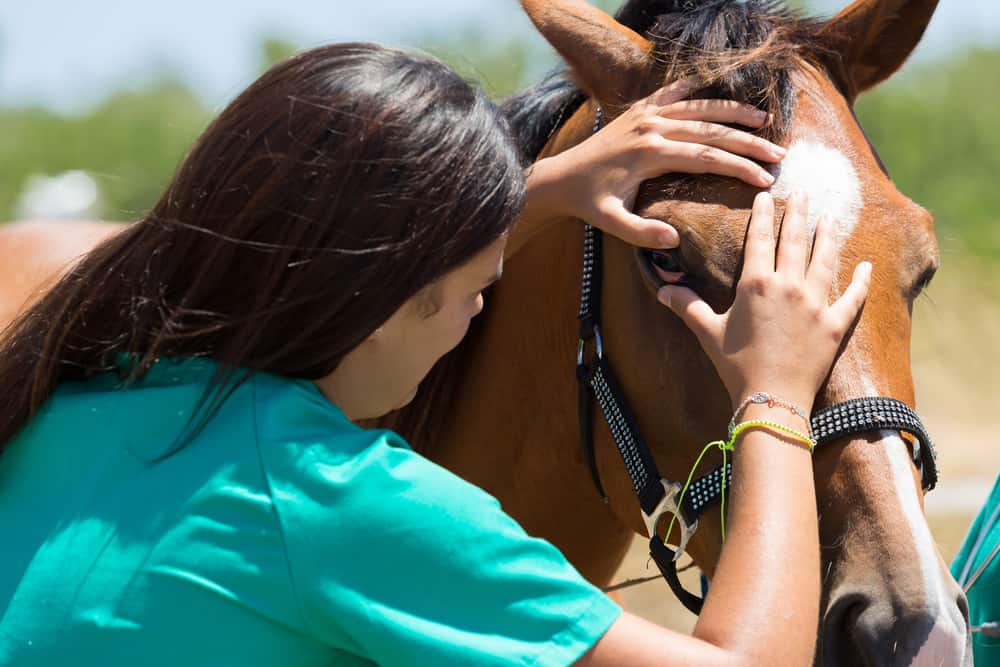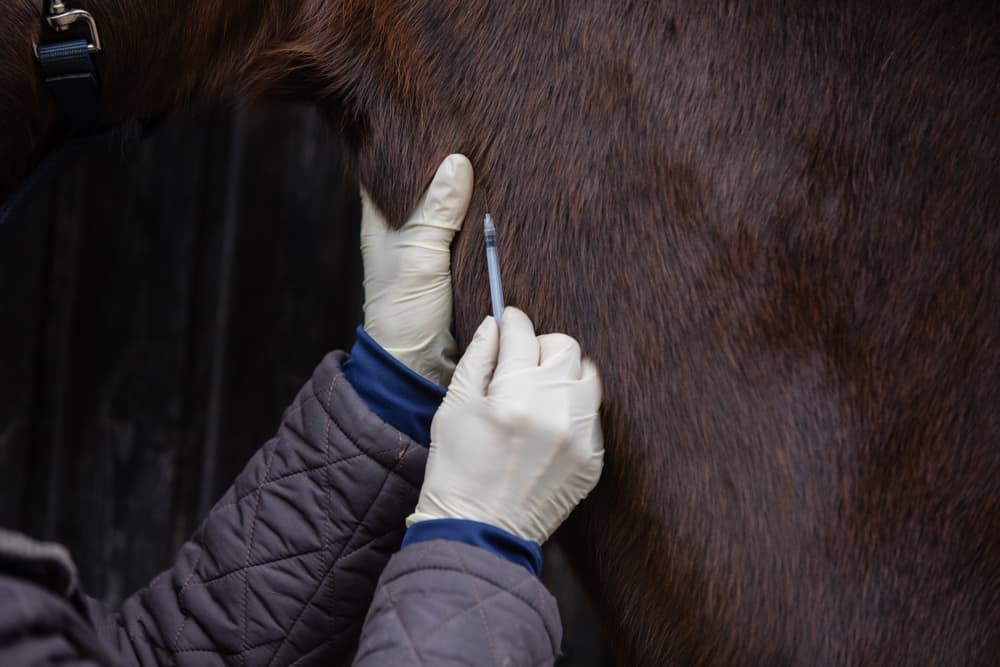We may earn a commission if you purchase something through one of our links. Commissions have no effect on our editorial content. The whole story is available to read.
You want to make sure that your horses are healthy and happy at all times when you’re taking care of them. Nonetheless, your animals may contract various illnesses despite your best efforts. There are occasions when you can’t avoid difficulties, even if you try your best.
You may make life simpler for your horse by understanding what to lookout for, although certain diseases cannot be avoided or cured. If you catch them early, others are simple to avoid or cure.
You should be knowledgeable about the most frequent horse disorders and symptoms to watch out for if you have horses or are considering getting one. Here are a few examples:

1. Laminitis

Animals may have a lot of difficulties with their feet if they spend a lot of time on them. Their feet, in addition to all of the problems with shoemaking, are often infected or swollen.
Horses’ hooves may be painful due to laminitis. Laminae layers (the link between the hoof wall and internal structures) become swollen and painful, resulting in this condition. The horse will work to keep the impacted region weightless.
Hormonal abnormalities and other diseases like equine metabolic syndrome (EMS) are frequently causes of this illness. Any inflammatory illness or overloading horses might also contribute to this.
When horses become insulin resistant, which affects their immune system and makes it difficult to fight illness, it is also a chronic problem.
This is a common condition that may be difficult to treat. It is responsible for the deaths of many animals each year.
How Do You Deal With Laminitis?
It might be time for a visit to the veterinarian if you notice that your horse’s hooves are hot and it’s struggling to put weight on its feet. Your horse may be given painkillers by the veterinarian after a medical examination to help with the disease’s symptoms.
In order to help with your horse’s discomfort while they’re healing, you might want to prepare some soft bedding. Box rest, nutritional modifications, and foot support are all likely to be recommended by your veterinarian. It may take many months to heal.
2. Equine Gastric Ulcer Syndrome

This condition affects the stomach and is also called gastric ulcer disease (GUD). It’s typically the result of digestive acids destroying the intestinal lining, and it causes ulcers in your horse’s stomach.
Equine gastric ulcer syndrome (EGUS) may develop if your horse is exercising and running about with an empty stomach. Because they don’t have any food to target, the acids eat away at the lining.
To keep the acids busy, always provide your horse with feed that is scattered throughout the day.
If feasible, offer food in small amounts on three or four occasions. Instead, allow them to graze freely. When there is no food to digest, an ulcer forms. This is avoided by regular food.
The following are the most common symptoms of EGUS:
- Poor performance
- Irritability
- Decreased appetite
- Sudden weight loss
- Fatigue
It would be a good idea to get a health checkup if your horse isn’t eating their food and they are more restless than usual. Before treating for EGUS, it’s important to rule out other possible causes of your ulcers’ symptoms.
How Do You Cure EGUS?
Your veterinarian will inform you if the discomfort is caused by EGUS after your horse has had an endoscopic exam. The next step is to administer oral medication to treat the ulcers if you get a diagnosis of this condition.
The medication of choice is omeprazole, which is effective.
In addition, you should increase alfalfa in your horse’s diet. Obviously, you must feed your horse on a regular basis. Secondly, before heading out to exercise, ensure they have had some food.
They should be back to normal in no time! As long as they have medication and something to eat before they go jogging, they should be fine!
3. Sweet Itch
There is a greater chance of skin problems when the weather gets warm and your horses spend more time in the sun outside. Sweet itch, also known as Seasonal Recurrent Dermatitis (SSRD), is most common during the summer season.
The horse’s extreme reaction to Culicoides midges is the primary cause of this disease.
This condition is apparent in patches of irritated skin and red sores, which may be observed at a glance by examining your horse. When this disorder strikes horses, they’ll be irritated all of the time, so you’ll notice it right away.
How Do You Cure Sweet Itch?
You may want to keep your horse somewhere sheltered during the morning and evening, since biting midges are most active then. A fly sheet, a fly mask, and fly spray are also recommended precautions.
If the vet agrees, you may administer antihistamines or steroids with soothing shampoos or sprays.
Of course, your veterinarian will provide you with further advice. However, these techniques might help you deal with your pet’s symptoms and soothe the itching.
4. Equine Influenza

Horses may contract the flu, just like people. Two distinct viruses spread via touch or may be carried on equipment, buckets, and brushes, and equine influenza is transmitted by them.
Equine influenza is spread from horse to horse through the upper respiratory system. It is vital that you keep an eye on this condition since it can spread quickly among a group of horses on your ranch.
A white or yellow discharge streaming from the nose is the first symptom of equine influenza. Horses may also have a fever and swollen glands. You should isolate your horse from other animals if any of these symptoms are present.
However, not all horses will exhibit symptoms. You’ll need to be extra watchful and on the lookout if you learn that canine infuenze is in your neighborhood.
How Do You Cure Equine Influenza?
You should speak to the veterinarian after separating a horse with influenza symptoms. When it comes to treatment, there might be a number of phases depending on how bad the sickness is. The most essential thing is that you keep your pet’s environment comfortable.
It’s important to pay greater attention to your horse during the recovery phase since influenza is horrible for both people and animals. As a result, you may wrap them in warm blankets and provide them clean hay.
Give the ill horse its own feeding bowl, feeding area, and stall to sleep in.
If an infection spreads to their lungs or sinuses, your veterinarian may prescribe medicine to lower your pet’s fever and antibiotics. Your horse should be back to normal after a few weeks of care and time off from work, although severe cases can be fatal.
To prevent the illness, speak to your veterinarian about vaccinations.
5. Arthritis

Osteoarthritis is another condition that may harm your horse’s health. Degenerative joint disease (DJD) is the term used by the veterinarian to describe this illness, and it’s also known as that. This is something that happens more often in older horses, so you should be aware of it.
It’s vital to keep your horse’s health long-term if you want to avoid potential illnesses. As a result, when your horse grows older and requires more attention, you won’t be confronted with unforeseen difficulties.
You must be prepared to care for your animal for years to come, much as you would with a human child. When life gets hectic, and there isn’t enough time to clean their living area or give them the companionship they need, some individuals adopt pets spontaneously and find it difficult to care for them.
It’s vital that you commit to taking care of horses for the rest of their lives. Therefore, you’ll have to be familiar with illnesses that affect them throughout their lives, particularly as they grow older.
In horses, as in humans, arthritis is common. The animal will move slowly and seem to be in pain because the joints will be swollen. After they’ve had a chance to warm up, they may seem to be in better shape, but they’ll be particularly stiff in the morning or after standing still.
How Do You Cure Arthritis?
One of those conditions that sneak up on you is arthritis, which may go unnoticed at first. Horses often become sluggish and sluggish as they age. However, their joints might become swollen if they stop moving as much.
Unfortunately, there is no cure for this condition. There isn’t much you can do for your elderly horse to cure it once they develop arthritis, since it is associated with aging. Yet, there is always something that you may do to make their life more convenient and pleasant.
Giving them the right amount of food will help keep their weight in check and reduce pressure on their joints.
If your veterinarian believes anti-inflammatory medication will be beneficial to them throughout the day and encourage them to exercise mildly, you can also give it to them.
6. Strangles

Streptococcus equi is the bacteria that causes strangles, which leads to horse illnesses in the upper respiratory system. It’s highly infectious, and it usually affects horses under the age of five. The immunity system of older horses appears to be stronger, allowing them to fight the illness.
Fever, nasal discharge, cough, nausea, loss of appetite, and weight loss are all symptoms that may occur. Sore lymph nodes and difficulty breathing are also possible. Infection rates may be reduced with a vaccination.
How to Treat Strangles
Keep your horse and all of its equipment away from other horses at first. Your horse will be given antibiotics, and you’ll need to do everything you can to help it recover.
7. Tetanus (Lockjaw)

Clostridium tetani, which is found in the soil everywhere across the globe, causes tetanus. A horse may be infected via the wound if it is wounded. Your horse is less likely to get sick if you clean its wounds properly and swiftly.
Tetanus can also occur if a wound is ignored or filthy. Muscle rigidity, difficulty moving, a stiff tail, facial twitches, perspiration, and eventual collapse will occur when it does.
Treating Tetanus
You won’t have to be concerned about this illness if you get your horse vaccinated. Any wounds should be cleaned immediately.
A strong dose of a tetanus antitoxin may often be used to cure the illness if you detect it early. Sadly, since the symptoms take time to develop, most cases aren’t discovered until it’s too late. There is nothing you can do at that moment.
Give Your Horse Love and a Good Home
Providing high-quality nourishment and comfortable living circumstances is critical as an owner. In order for the veterinarian to examine the horse and its health, you should be scheduling health exams on a regular basis. Early diagnosis and treatment of any of these illnesses may help to improve your condition.